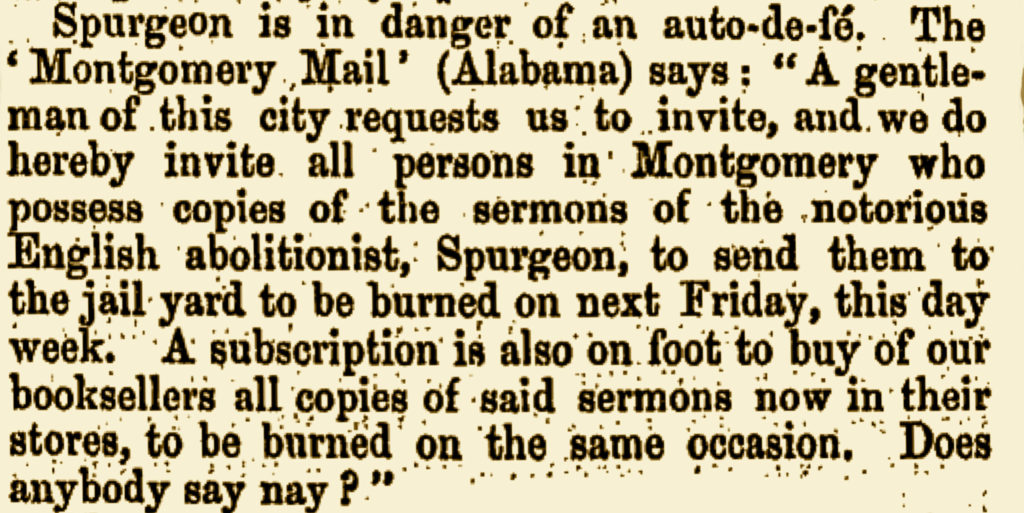
Abraham Lincoln issued the Emancipation Proclamation 154 years ago today, promising liberty to some 3 million enslaved black men and women.
Charles Spurgeon also fought the evils of slavery:
“[The] hope of deliverance seemed far away, it was God that gave an Abraham Lincoln, who led the nation onward till ‘Emancipation’ flamed upon its banners” (MTP 29:243).
Spurgeon exchanged correspondences with Frederick Douglas, received former slaves into his Pastors’ College and pulpit, and condemned slavery in his sermons and media articles:
“I do from my inmost soul detest slavery . . . and although I commune at the Lord’s table with men of all creeds, yet with a slave-holder I have no fellowship of any sort or kind. Whenever one has called upon me, I have considered it my duty to express my detestation of his wickedness, and I would as soon think of receiving a murderer into my church . . . as a man stealer” (Pike, The Life and Work of Charles Haddon Spurgeon, p. 331).
How did America respond to Spurgeon’s abolition?
Here are a few published comments from different parts of the country:
Florida: Spurgeon is a “beef-eating, puffed-up, vain, over-righteous pharisaical, English blab-mouth.”
“A Southern Opinion of the Rev. Mr. Spurgeon,” The New York Herald (March 1, 1860).
Virginia: Spurgeon is a “fat, overgrown boy.”
“The Great Over-Rated,” The Daily Dispatch (August 17, 1858).
Louisiana: Spurgeon is a “hell-deserving Englishman.”
“Spurgeon on Slavery,” The Bossier Banner (February 24, 1860).
South Carolina: Spurgeon is a “vulgar young man” with “(soiled) sleek hair, prominent teeth, and a self-satisfied air.”
“Spurgeon and the Lady,” Charleston Courier (June 15, 1858).
North Carolina: Many “would like a good opportunity at this hypocritical preacher.”
“Rev. Mr. Spurgeon,” The North Carolinian (February 18, 1860). Additionally, anyone selling Spurgeon’s sermons in Releigh should be arrested and charged with “circulating incendiary publications” (“Rev. Mr. Spurgeon,” The Weekly Raleigh Register [February 15, 1860]).
Spurgeon’s character was assassinated throughout the Confederacy. His sermons, which in 1862-1863 sold one million copies annually, were censured. His books, which sold 1,000 copies per minute at trade shows, were publicly destroyed. Sermon bonfires illuminated jail yards, plantations, and bookshops throughout the Southern states.
The following article appeared in an Alabama newspaper (Montgomery Mail, repr. in “Spurgeon’s Sermons—a Bonfire,” Nashville Patriot [March 15, 1860]):

Apparently, not many people said “Nay.” For it was recorded a few days later in a ledger:

What would have happened if Spurgeon had visited the Southern states in 1860 as he planned to do?
America might have executed him:
“If the Pharisaical author should ever show himself in these parts, we trust that a stout cord may speedily find its way around his eloquent throat” (“Mr. Spurgeon’s Sermons Burned by American Slaveowners,” The Southern Reporter and Daily Commercial Courier [April 10, 1860]).
(An expanded version of this research is in The Lost Sermons of C. H. Spurgeon, Volume 1, preface).